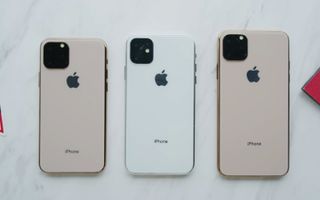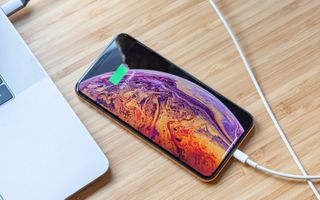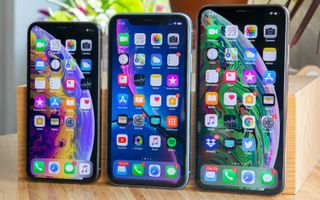iPhone 11: Four Features It Needs For Me to Upgrade
These are the new iPhone’s must-have additions

Look, right now I don't plan on buying the iPhone 11, or whatever Apple calls the new iPhone it releases at its Apple event tomorrow (Sept. 10). My iPhone SE still has another year of life left in it — it's my preferred size for a mobile device, it'll run iOS 13, and I like to run my hardware into the ground before I upgrade. (In this last part, I am increasingly not alone, at least when it comes to smartphones.)
So Apple could announce an iPhone 11 that's clearly better than anything that's come before — that makes the likes of Samsung and Google and others tremble in their boots — and I would nod respectfully and then go back to looking at my iPhone SE screen.
But it doesn't have to be that way.
While Apple doubtlessly has many improvements planned for this year's iPhone updates and will outline them all in exquisite detail on Tuesday, just a handful of enhancements and additions would make me rethink my loyalty to my current iPhone.
These changes may not be enough to get me to upgrade, but they'd certainly give me a case of iPhone envy until that rumored iPhone SE successor shows up at some point in 2020.
A truly improved camera
There's no doubt the iPhone 11 and iPhone 11 Pro models are going to improve upon the camera's in last years phone. If nothing else, Apple's likely to add extra lenses — a second camera to the back of the iPhone XR's successor, and a third ultra wide-angle camera to whatever replaces the iPhone XS and XS Max — expanding the iPhone's photographic bag of tricks.

But more lenses doesn't necessarily make for a better camera. What I'd like to see is Apple spending some time and effort beefing up the image processing on this year's iPhone.
Specifically, while the current iPhones do all right snapping photos when the lights are low, they're far outpaced by the night shooting modes offered by Google's Pixel 3 and Samsung's Galaxy S10 and Galaxy Note 10 phones. The iPhone 11 will have to introduce some improvements to how Apple handles low-light images if this new phone is to keep pace with what's already available, let alone surpass the best camera phones.
And if Apple is going down the multiple camera route, I'd like the company to justify how the iPhone Pro's three cameras are better than the iPhone XS's two — not to mention the fact that Google's Pixel phones get by with just one, and still outperform whatever Apple's produced to date. Based on reports, the new iPhone could produce photos that take all the images captured by each lens and combine them into one super shot, but seeing is going to be believing on whether that feature is enough.
Battery life improvements
When you hold on to your phone for more than few years, one area where you're making a trade-off is battery life. Even with the under-the-hood improvements Apple has made to recent iOS versions, my iPhone SE doesn't go as long on a charge as it used to. So yes, I'm interested to see how long the iPhone 11 models before you need to recharge them.

There's definitely room for improvement here. While the iPhone XR turned in an impressive time of 11 hours, 26 minutes on our battery test — good enough to stick around on our list of the longest-lasting smartphones for the past year — the iPhone XS and XS Max didn't fare as well on our test, which involves continuous surfing over LTE until the phone runs out of battery life. The XS Max's time of 10:38 is alright, but the XS's 9:41 result was below the average smartphone's battery life.
Apple apparently is adding a fast charging to the iPhone 11 models, similar to what Samsung's Galaxy flagships currently offer. That's a nice addition, but the really important change could be the rumor that battery size will increase for the iPhone 11. I'd also like to hear if the A13 processor, besides delivering expected speed boosts, can also manage power more efficiently than before.
A more durable iPhone
After months of rumors surrounding iPhone 11 features, the one that really made me sit up and take notice was included in a Bloomberg report about Apple's iPhone plans. That report talked up a lot of features such as camera improvements, multi-angle Face ID and new colors, but to me, the biggest addition was the news that some new iPhone models would feature shatter-resistance technology.
I have no problem admitting I'm a clumsy oaf who drops his iPhone at least once a week. That's why I have my iPhone SE currently enclosed in a brick-like case that's durable enough to endure the worst my butter fingers can dish out, but the downside is a bulky case that hides Apple's design flourishes.
I'd love to ditch my protective case and carry an iPhone around that shows off its full glory, so if that shatter-resistance rumor pans out, the iPhone is definitely a more interesting option to me.
A lower price
OK, this one's not going to pan out at all. Apple seems pretty committed to pricing its entry-level iPhone at around $750 with the Pro models coming in at $999 and higher. (Nothing helps a company weather slower overall sales than driving up the average selling price of the models you are able to move.) I'd expect Apple to announce prices for the iPhone 11 in line with what it's asking us to pay for the iPhone XR, XS and XS Max.

But you can't help but look at what Google and Samsung are doing with their Pixel 3a and Galaxy A50 models and wonder if Apple shouldn't do the same. By shedding a few features, Google and Samsung can offer some still compelling handsets at much more attractive prices.
Apple's probably not going to roll out a midrange model — at least not this year — but if it could find a way to shave a couple of bucks off the price of the iPhone 11, that's another mark in the column for upgrading to this year's models. Most likely, you'll have to wait for the reported 2020 rebirth of the iPhone SE.
Outlook
I'm a big believer in not waiting to upgrade your phone if your current handset isn't up to the task and the new model that comes along ticks the right boxes for your needs. For a lot of people, the iPhones Apple unveils this week are going to do just that. I'm guessing for me, they won't... but I'm willing to be convinced otherwise.
Sign up to get the BEST of Tom’s Guide direct to your inbox.
Upgrade your life with a daily dose of the biggest tech news, lifestyle hacks and our curated analysis. Be the first to know about cutting-edge gadgets and the hottest deals.
Philip Michaels is a Managing Editor at Tom's Guide. He's been covering personal technology since 1999 and was in the building when Steve Jobs showed off the iPhone for the first time. He's been evaluating smartphones since that first iPhone debuted in 2007, and he's been following phone carriers and smartphone plans since 2015. He has strong opinions about Apple, the Oakland Athletics, old movies and proper butchery techniques. Follow him at @PhilipMichaels.

